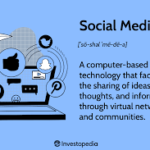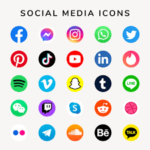B2B marketing in social media communication plays a crucial role in connecting businesses and facilitating professional relationships. This article explores the significance and key aspects of B2B marketing in social media communication.

- Establishing Thought Leadership:
Social media platforms provide an avenue for B2B marketers to position themselves as industry thought leaders. By sharing valuable insights, industry trends, and expertise, businesses can establish credibility and trust among their target audience. Thought leadership content helps attract potential clients and build long-term relationships. - Building Professional Networks:
B2B marketing in social media communication revolves around building and expanding professional networks. Platforms like LinkedIn offer opportunities to connect with industry peers, decision-makers, and potential clients. Engaging in relevant industry groups and discussions helps businesses expand their network, gain visibility, and generate leads. - Content Marketing and Lead Nurturing:
Content marketing plays a pivotal role in B2B marketing on social media platforms. Sharing informative and educational content, such as blog posts, whitepapers, case studies, and webinars, helps attract potential clients and nurture leads. By delivering valuable content, businesses can position themselves as trusted advisors in their respective industries. - Targeted Advertising:
Social media platforms provide robust targeting options for B2B marketers. Businesses can leverage advanced targeting features to reach their ideal customer profile based on factors such as job titles, company size, industry, and interests. Targeted advertising helps businesses maximize their budget by reaching a highly relevant audience. - Relationship Building and Personalized Engagement:
B2B marketing in social media communication focuses on building and nurturing relationships with potential clients. Personalized engagement, such as personalized messages, tailored content, and one-on-one interactions, helps businesses establish trust and foster meaningful connections. Building relationships through social media lays the foundation for future business collaborations. - Showcasing Success Stories and Testimonials:
Social media platforms offer an ideal space for B2B marketers to showcase their success stories and client testimonials. Sharing case studies, client testimonials, and success stories highlights the value and impact of their products or services. This social proof helps build credibility and instills confidence in potential clients. - Utilizing Influencer Marketing:
Influencer marketing is not limited to B2C; it also holds significance in B2B marketing. Collaborating with industry influencers or experts can amplify brand reach, enhance credibility, and increase visibility among the target audience. Influencer endorsements or collaborations help businesses establish themselves as reputable and trustworthy partners. - Utilizing LinkedIn for Lead Generation:
LinkedIn, the professional networking platform, is a valuable tool for B2B lead generation. Businesses can leverage LinkedIn’s advanced search filters, join relevant industry groups, and participate in discussions to connect with potential clients and generate leads. LinkedIn’s messaging and advertising features further enhance lead generation efforts.
B2B marketing in social media communication offers businesses opportunities to establish thought leadership, build professional networks, engage in content marketing, target specific audiences, nurture leads, showcase success stories, leverage influencers, and utilize platforms like LinkedIn for lead generation. By implementing these strategies effectively, B2B marketers can strengthen their brand presence, foster relationships, and drive business growth in the dynamic landscape of social media.











































